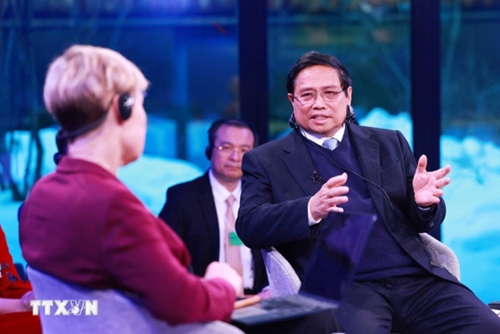It is a key event on the first official day of the 55th WEF meeting and one of the five major policy dialogues with heads of state and government leaders recognized by the WEF for their vision, influence, and ability to inspire. It was broadcast live across the WEF’s major online platforms.
The dialogue between Prime Minister Pham Minh Chinh and renowned host Gillian Tett, editor-at-large of Financial Times, delivered a powerful message hailing Vietnam as a highly attractive strategic choice for foreign investors amid global competition.
Drawing on the country’s 40-year journey of economic reform and growth, it underscored Vietnam’s determination and breakthrough development policies aimed at seizing opportunities in the intelligent age where sci-tech, innovation and transformation will drive Vietnam to achieve its ambitious goal of becoming a high-income, developed economy by 2045.
Commenting on the current global context, Prime Minister Pham Minh Chinh stressed that the intelligent age must be marked by political stability, freedom from war, rapid yet sustainable economic growth, environmental protection, and inclusivity which no one is left behind. This era must be closely linked with the development of intelligent minds and data-driven infrastructure, he asserted.
    |
 |
|
Prime Minister Pham Minh Chinh at the event |
To prepare for the intelligent age, Prime Minister Pham Minh Chinh stated that Vietnam is committed to improving its institutional and legal frameworks to create favorable conditions for equal development among stakeholders in the multi-sectoral economy; and defines that the development of artificial intelligence (AI) in Vietnam must be based on Vietnamese data. The newly issued Resolution 57 on the development of science, technology, innovation, and digital transformation will provide a strong boost for investment in research and development, he elaborated.
The Vietnamese Government is also focusing on ensuring intellectual property rights to create a fair legal framework for foreign investors in the technology sector, Prime Minister Pham Minh Chinh said, adding that it has made efforts to promote investment, mobilize social resources, and encourage businesses to develop transport infrastructure and smart infrastructure, with plans to complete the construction of a national data center by June 2025.
The Government leader emphasized that although Vietnam has faced various challenges, with a low starting point and a transitioning economy, through these efforts, it has become an important partner in terms of research and development cooperation and an attractive investment destination for major global tech groups like Samsung and NVIDIA.
While answering a question about whether Vietnam can balance its relations with both the U.S. and China amidst strategic competition, the Prime Minister stressed that Vietnam remains steadfast in its foreign policy of independence and self-reliance, multilateralization and diversification, and being a good friend, a reliable partner, and an active and responsible member of the international community.
In reply to concerns about Vietnam's trade surplus with the U.S., Prime Minister Pham Minh Chinh said Vietnam is always ready to listen to, discuss, and address issues that concern its partners; and wants to make the most of its competitive advantages, increase imports, and strengthen cooperation in areas where the U.S. has strengths and Vietnam has needs, such as aviation and high technology.
Regarding challenges from climate change and achieving the dual goals of economic development and environmental protection, he emphasized that, as one of the countries most affected by climate change and rising sea levels, Vietnam is strongly committed to achieving net-zero emissions and is making efforts to promote green transition and green production.
The Vietnamese leader shared specific and impactful examples, including a project on developing 1 million hectares of high-quality, low-emission rice as part of efforts to ensure global food security and promote green growth.
Regarding energy transition, he said that Vietnam is accelerating efforts to improve institutional frameworks to unlock resources for renewable energy development, and the country has also initiated a nuclear power project to ensure a clean energy supply for the country’s development.
In her conclusion remarks, Tet shared opinions of foreign investors, describing Vietnam as an impressive country with its economic transformation over the four decades of reform.
The nation has maintained strong and long-term growth momentum, attracted a large number of foreign direct investment projects, ensured financial and monetary stability, and achieved an economic growth rate of over 7% even amidst global economic challenges in 2024, she noted.
With the goal of double-digit economic growth in the near future, Vietnam will become a model of development in the world, she said.
The official also highly valued the contribution of the business community and the Vietnamese Government's commitment to national development and interests.
Participants applauded the messages shared by the Vietnamese leader at the event. The success of the policy dialogue session, held for the second consecutive year at the WEF, helped strengthen Vietnam's international role and position, and contributed to spreading the Southeast Asian country’s great achievements in recent years, as well as its vision and development prospects in a new era - the era of the nation’s rise.
Source: VNA